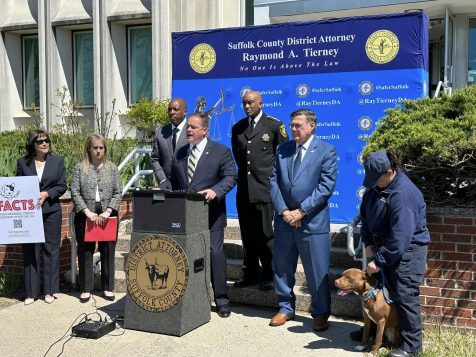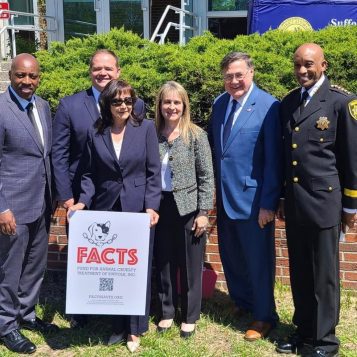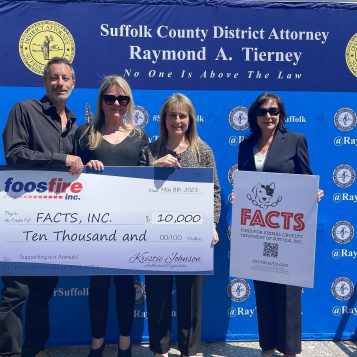Suffolk County District Attorney Raymond A. Tierney has announced that the Suffolk County District Attorney’s Office, along with the Suffolk County Police Department, and the Suffolk County Sheriff’s Office, has partnered with the Fund for Animal Cruelty Treatment of Suffolk, Inc. (“FACTS”), a 501(C)(3) not-for-profit organization, for the utilization of their animal cruelty crime victims fund.
“Prosecuting an animal cruelty case is unlike any other crime, in that the evidence of the crime consists of a living, breathing animal that needs to be cared for while the case or investigation is pending,” said District Attorney Tierney. “Abused or neglected animals require a significant amount of resources including veterinary care, shelter, transportation, medication, and food. We have partnered with FACTS so that the money needed for the care and recovery of abused and neglected animals can be funded by donations, alleviating the burden on Suffolk County taxpayers.”
“FACTS is proud to partner with the Suffolk County District Attorney’s Office, Suffolk County Police Department and the Suffolk County Sheriff’s Office by providing costs of care that benefit animal cruelty victims,” said Joyce Glass and Barbara Dennihy, co-founders of FACTS. “This funding allows animal victims to receive necessary care while recovering and cases are pending. FACTS meets an identified need during the investigation and prosecution of cases, focusing on victims without a voice. Donations to FACTS allow us to speak for animal victims by providing the care and treatment they deserve.”
“Animal cruelty cases are particularly disturbing as the victim is defenseless and voiceless,” said Suffolk County Police Commissioner Rodney K. Harrison. “This new partnership ensures that injured or neglected animals receive the necessary care they deserve while the case moves through the court process. This is a win-win for animal rights as well as Suffolk County taxpayers.”
“Often times, when our Deputy Sheriffs are reporting to a domestic violence situation or similar crime, they find animals that are also victims of cruelty or abandonment,” said Suffolk County Sheriff Errol D. Toulon, Jr. “This partnership with FACTS will allow us to immediately get these animals the proper treatment and housing they deserve without worrying about where the funding for their care is coming from.”
Financial assistance from FACTS will help treat and care for animals that are victims of criminal animal cruelty investigations that are being prosecuted by District Attorney Tierney’s Biological, Environmental, and Animal Safety Team.
To kick off FACTS’ fundraising, Kristie Johnson, president of Foos Fire, Inc., a local Suffolk County fire sprinkler business, and Kristie’s husband, Christopher Johnson, presented FACTS with a $10,000 check.
If you would like to donate to FACTS, please visit www.FACTSSAVES.org, and click on the “Donate Now” button. You can also donate to FACTS on Venmo, to username @factssaves. Donations can be mailed to: FACTS, 2168 Nesconset Highway, Suite # 310, Stony Brook, New York 11790.







